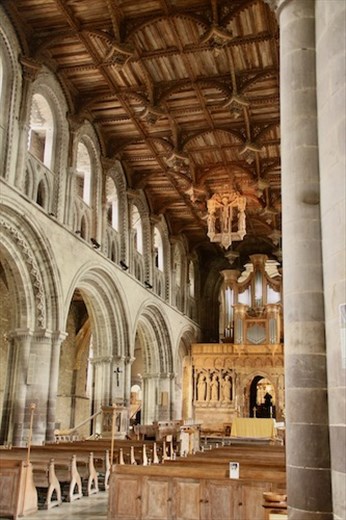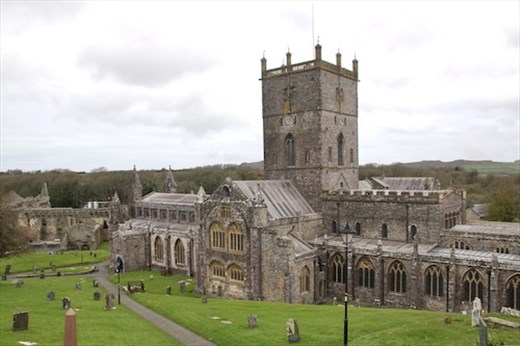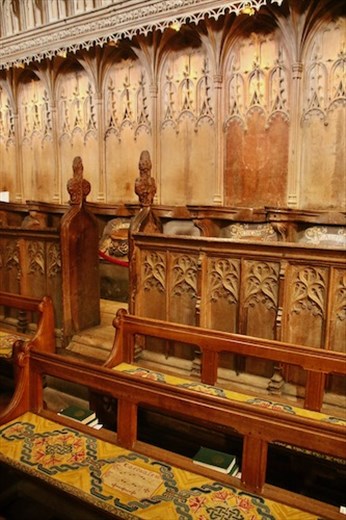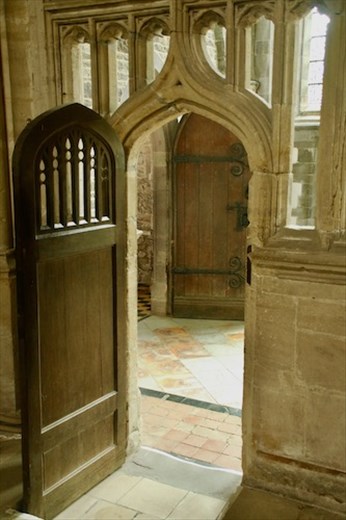SANT DEWI YW NAWDDSANT CYMRU. Saint David is the Patron Saint of Wales. Now I understand why we feel so disoriented—we didn’t even know that Cymru was Welsh for Wales! Next time I want to strengthen my password, I’ll write something in Welsh and add a number and symbol. Hacker-proof!

Y Bwythyn, Spittal, Pembrokeshire, Wales

Welsh can leave you tongue-tied . . . and lost
Our AirBnB address is Y Bwythyn, “The Cottage,” in the village of Spittal. If it weren’t located next to the Pump on the Green pub (and that hadn’t been in English) we would likely still be roaming around Pembrokeshire. But it’s a lovely apartment with everything one could ask for except a pasta pot. I guess when you can chow down on pasties you don’t need pasta.

The City of St. Davids

Pasties, not Pasta
With only 1600 residents St. Davids (no apostrophe) in Pembrokeshire is the smallest “city” in the UK. Wells, the smallest city in England, has ten times as many people. Like Wells, St. Davids is considered a “city” by dint of having a cathedral, coincidentally named St. Davids Cathedral.

Sant Dewi and his White Dove
Despite being the Patron Saint of Wales, St. David doesn’t even make the top 250 popular saints, falling somewhere down the list of the more than 10,000 saints recognized by the Catholic Church. A local Pembrokeshire boy, he was born around 520 and most of what was written about him came from half a century after his death. During medieval times it was believed he was a nephew of King Arthur, whose own existence is mostly legend. David was credited with performing the standard every-day miracles like raising the dead and restoring sight to a blind man. His magnum opus took place while he was preaching to a large crowd. When some people complained “We can’t hear you!” a white dove landed on his shoulder and the ground was standing on became a hill so everyone could see and hear him. Ta-da!

Santuary of Saint David, St. Davids Cathedral, St. Davids, Wales

The nave has sunk three meters in a century
When he died his remains were buried in the monastery which was later ransacked by Viking invaders. David was canonized in 1120 by Pope Callactus II, not a well-known pontiff himself. Soon after David became the Patron Saint of Wales and so many pilgrims came to St. Davids that the Pope decreed that two such journeys equaled one pilgrimage to Rome and three would be the same as a pilgrimage to Jerusalem.

Two pilgrimages to St. Davids equals one to Rome
St. Davids Cathedral was built around 1180 on the site of St. David’s monastery. It’s nothing to write home about and the Bishop’s Palace is a ruin. The swampy ground has taken its toll on the Cathedral—the walls tilt inward and the floor slopes downward almost 12 feet from the Lady Chapel to the entrance. Walking around the grounds is pleasant and the town—I mean city—of St. Davids is charming, even on a gloomy April Day.

St. Davids Cathedral and the ruins of the Bishop's Palace

Choir of St. Davids

Two doors, St. Davids Cathedral
I guess it is obvious that I am not Catholic. Nor Christian. Nor spiritually inclined. The road to hell may possibly be paved with my blog entries.